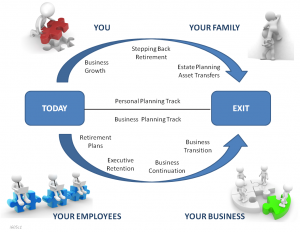
Jim Lorenzen, CFP®, AIF®
1954
1986
2017
What do those years have in common? If you guessed those were the years of major tax reform, you’d be right—at least about the first two. 2017 is still a question mark.
While tax law changes can occur quite often, major reforms appear to come around about every thirty years. Business owners, unlike the rest of America, will have to deal with the impact of any changes on both the personal and business front.
Most Americans don’t own businesses and can be excused for not understanding many of the issues business owners face. First, most businesses tend to be small – proprietor-owned – and are therefore taxed at individual rates; and that includes partnerships. They don’t get taxed at the lower corporate rate; yet, these owners represent most of the job creation. Those who are successful, pay at high rates – and even more if they’re in a high tax state! It’s not uncommon for a successful small business owner in a high-tax state, like California or New York, to be faced with having to make $300,000 in pretax profit, only to see half of it go to federal, state, and local government, leaving about $150,000. Sound like a lot? Not if you’re in one of those high cost-of-living states, which usually happen to be the same ones, in which case $150,000 is often just middle-income. Makes it pretty hard to create jobs for other people – often the reason many of these businesses often relocate to low-tax states (with a lower cost of living) to grow their businesses, where they find it easier to create jobs.
How about corporations? Most Americans don’t realize that those who incorporate their businesses are taxed twice. Their business pays a tax on profits BEFORE the business pays a salary to the business owner, who then must pay a second income tax! And, of course, we’re back to the high income-tax state issue.
The government drains money from the people who create the jobs; so, no wonder – as people want to see more jobs in the economy – tax reform is such a big issue.
Proposed Changes for Business
Under the proposed tax bill, which still faces much debate, the corporate tax rate would be reduced to 20% – a substantial cut. S-Corps would see their rate drop to 25%. Well, maybe not – what day is it? This all changes with the wind until it’s law.
One of the proposed changes, favored by many business owners, would allow for the expensing of capital expenditures—no doubt in an effort to spur growth. However, there could be a fly in the ointment for many business owners in a provision no one’s talking about.
You’ve heard about the ‘border tax’. Under this provision, there would be no cost-of-goods deduction on imported goods—a potential problem for many retailers, as well as manufacturers who outsource some or all of their supply chain.
Many businesses that have spent years researching and developing their supply chains may face some formidable challenges. There would be a deduction for the cost of goods exported.
Finally, there would be no deduction for business loan interest under the proposed plan. This may not be a big issue now, given today’s low interest rates; but, it could become a major issue if we should ever experience the double-digit interest rates similar to those of the late 1970s.
 Business owners are individuals, too.
Business owners are individuals, too.
As if dealing with all a business owner faces isn’t enough, there’s also the personal side. There are some potential changes looming on the horizon there worth knowing about.
Individual tax rates would come down and reduced to three brackets.
The elimination of all itemized deductions except for mortgages and charitable contributions is also popular with many, but not everyone. The proposed change for charitable deductions limits those deductions to $100,000 for a single payer and $200,000 for a married couple. It may become difficult for a charity to convince a multi-millionaire to donate that $1 million work of art !
And, while there’s talk of repealing the estate tax, it doesn’t appear to be a complete repeal. The government still wants that unrealized appreciation taxed! The talk is about going to a system similar to what they have in Canada.
The idea would be to tax unrealized appreciation over $5 million at a capital gains rate. Taxes on gifts would correspond to eliminate people using gifting to avoid the estate tax.
Finally, the newest proposal would also do away with deductions for medical expenses—or at least have a very high threshold.
All these are proposed—not passed. But, it’s good to be aware

of what could be on the horizon.
What Should Business Owners Do?
You might discuss these points with your tax advisor—I am not a CPA. I am a CFP®, AIF®,,,, EIEIO.
Planning Point
If you don’t have an executive bonus plan, you may want to consider starting one and paying the bonus before March 15, 1018. Same if you do have one. Your business gets the 2017 deduction while the employee may be paying tax on the bonus received at lower tax rates. If you’re `grossing up’ the bonus to cover the employee’s tax payment, that would be under the 2018 rates, as well—remember, talk to your tax advisor. If you want to learn more about these plans, you can access my special report here.
Planning Point
Don’t neglect what is probably the most versatile financial tool available today: cash value life insurance—it has tax benefits that no other financial vehicle can provide and is an ideal retirement supplement—especially for high-earning executives and owners who are limited in what they can put away in qualified tax-deferred vehicles. Quite often, these executives are stunned to find out those limits simply will not allow the account to provide enough capital at retirement for them to preserve their desired lifestyle.
 As David McKnight points out in his book, Tax Free Retirement, life insurance is used as a key retirement strategy by more than 85% of Fortune 500 CEOs and many members of Congress. The book was also endorsed by retirement guru and CPA Ed Slott, as well as David M. Walker, former Comptroller General of the United States.
As David McKnight points out in his book, Tax Free Retirement, life insurance is used as a key retirement strategy by more than 85% of Fortune 500 CEOs and many members of Congress. The book was also endorsed by retirement guru and CPA Ed Slott, as well as David M. Walker, former Comptroller General of the United States.
Sometimes, I will see arguments against this approach in the media – arguments that are little short of idiotic – but, the simple truth is that insurance, including indexed universal life (IUL) in particular, is becoming widely accepted among leading experts in the profession as a true asset class (in addition to cash, stocks, bonds, real estate, and commodities), probably as a result of an aging population with changing priorities and increasing economic uncertainty (where the government’s future need for tax revenue is concerned).
- Your tax advisor can provide the best insight regarding tax strategy;
- your estate planning attorney can help you make sure your documents are updated and in order; and
- your financial advisor should be able to help you arrange assets to fit your needs.
Never use a podiatrist for dental advice.
I hope you found this helpful.
If you would like help, of course, we can always visit by phone.
Enjoy!
Jim
Jim Lorenzen is a CERTIFIED FINANCIAL PLANNER® professional and An Accredited Investment Fiduciary® serving private clients since 1991. Jim is Founding Principal of The Independent Financial Group, a registered investment advisor with clients located across the U.S.. He is also licensed for insurance as an independent agent under California license 0C00742. The Independent Financial Group does not provide legal or tax advice and nothing contained herein should be construed as securities or investment advice, nor an opinion regarding the appropriateness of any investment to the individual reader. The general information provided should not be acted upon without obtaining specific legal, tax, and investment advice from an appropriate licensed professional.




